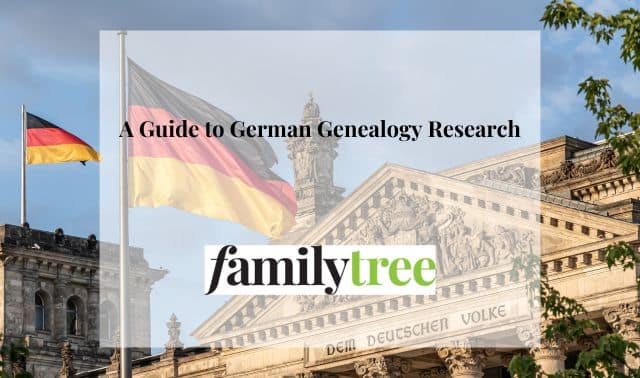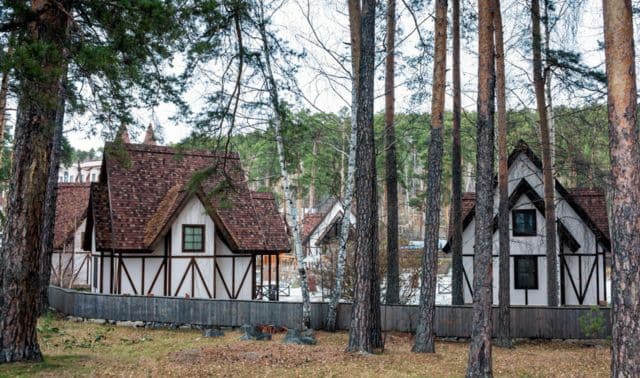Sign up for the Family Tree Newsletter! Plus, you’ll receive our 10 Essential Genealogy Research Forms PDF as a special thank you.
Get Your Free Genealogy Forms
"*" indicates required fields

If I had to rank the most important recent technological developments for genealogists, online newspapers would be somewhere near the top. You have the amazing ability to scour millions of newspaper articles for an ancestor’s name. And not just historical US titles: Newspapers from around the world, some dating back to the 18th century, are now online.
Most collections of foreign newspapers offer full-text searching, and many online historical newspapers are free. Because few foreign newspapers are available to borrow on interlibrary loan, digital access is a tremendous boon. These old pages might hold references to immigrant ancestors before they left home or stories about American relatives traveling abroad, serving in the military or doing missionary work. Our guide will show you where to find historical newspapers online, offer guidance on searching and suggest tools for overcoming language barriers.
Online Newspaper Search Tips
Some online newspaper collections require a paid subscription, but many are free. Others are available only through participating libraries. Check the websites of university and public libraries in your area, or call and ask if they subscribe to a particular newspaper collection. For links to even more online newspapers, see ICON: Newspaper digitization projects, Wikipedia and XooxleAnswers.
The same search strategies you use for American newspaper archives work with foreign ones: Search on a last name or a full name. Put quotation marks around a name to find the exact phrase. Try different versions of the name, such as John H. Pennington, J. H. Pennington and John Hudson Pennington. To zero in on the most relevant matches, especially if you’re looking for a common name, add a keyword, such as a place, an occupation or other term associated with the person.
To make newspapers searchable, optical character recognition (OCR) software is used to convert page images to text. Where pages are faded or printing was poor, OCR can “misread” the words and mess up your searches. So if your search doesn’t turn up anything or the site doesn’t support full-text searching, try browsing the papers. For instance, if you have at least an approximate date and place of a marriage or death, peruse pages of papers published around that time for a marriage notice or an obituary.
Some overseas newspaper websites offer interfaces in more than one language. Look for a British flag you can click to access an English-language version. If there isn’t one, use Google’s Chrome web browser. When you visit a foreign-language site, Google will ask you if you want to view a translated version; click Translate. (Or you might need to click a symbol shaped like two squares in the address bar to translate the page.) If the newspapers are in a foreign language, use search terms and place-name spellings in that language. Use Google Translate for help translating foreign-language articles. If you need a better translation, you can ask for help on a message board such as those at Ancestry.com.
If a newspaper site won’t let you download an article, take a screenshot. To find the Windows Snipping Tool, click Start, then All Programs, then Accessories. On a Mac, hit Shift+Command+4 and use the crosshairs to select the article.
Historical Newspapers on Big Genealogy Websites
Several big websites you might already be familiar with have newspapers from multiple countries:
Ancestry.com
Ancestry.com has newspapers from Canada and the British Isles, including The Times of London (1788 to 1833); newspapers published in Winnipeg, Manitoba, from as early as 1900; and papers from Edinburgh, Scotland, from as early as 1771.
Some collections are linked to images, while others are browse-only. One notable collection fitting the latter description is “Ireland, Newspapers, 1763–1890”: It includes titles from what’s now the Republic of Ireland and Northern Ireland, but you can’t search them—you have to browse page by page.
A collection of Belfast newsletter birth, marriage and death notices has images of the pages, plus a searchable index to birth, marriage and death notices from 1828 to 1907. The matches for my McMorris relatives include a marriage notice for Sarah McMorris, daughter of John McMorris, to Robert Monteeth. A Presbyterian minister married them at Donagheady in 1844.
Ancestry.com’s main search form covers the searchable newspapers. But to search just newspapers, select All Collections from the Search tab, then look under Stories & Publications on the right and click Newspapers.
Newspapers.com
Launched in 2012 by Ancestry.com, this subscription site offers papers from the United States, Australia, Canada, Panama and the British Isles, including 165,000 Irish newspapers. You can search the full text of the papers and view images of the pages.
A search for the name of my Welsh third-great-granduncle Evan Jones, who lived from 1808 to 1819, produces more than 600 matches from those years in the site’s English newspapers. The first one is my guy. The Times notice from 1813 tells how the belongings of the bankrupt Evan Jones, a draper on Drury Lane, would be sold and the proceeds divided among his creditors.
Findmypast
The large collection of newspapers here is digitized and fully indexed. Go to the Search tab, then select Newspapers & Periodicals (near the bottom, under Special Collections) to search all the site’s newspapers at once. From there, you’ll see four options:
- British newspapers include thousands of local and regional publications from England, Scotland and Wales.
- Irish newspapers include publications from both the Republic of Ireland and Northern Ireland.
- PERSI (the Periodical Source Index) references genealogical and historical periodicals from North America, Great Britain, Ireland and Australia. Some of these references are linked to articles.
- US & World newspapers include publications from the United States, Canada, Europe, Asia, South Africa and Jamaica.
My Morgan ancestors lived on a farm called Maestorglwyd (also written as Maesdorglwyd) in the parish of Llanigon, Breconshire, Wales. Instead of searching on Morgan, a common Welsh name, I searched on the more-unusual farm name. A keyword search of the British newspapers collection for Maesdorglwyd turns up an 1852 article in the Hereford Times: a notice my third-great-granduncle William Morgan of Maesdorglwyd placed as executor of his brother-in-law Benjamin Jenkins’ will.
Google News Archive
In addition to many digitized newspapers from the United States and Canada, Google includes a few titles from Latin America and Europe. To search, enter your terms in the box beside Google News and click on Search Archive.
Google News Archive is a great tool, but it’s not perfect. You can’t limit your search to a specific newspaper here. In addition, Google has stopped adding to or enhancing this collection, and searches seem less reliable than in other newspaper collections. If you have at least an approximate date, it’s worth browsing for an article. Google News Archive lists the dates each newspaper covers, but it doesn’t show where they were published. So if you can’t tell from the title, you might have to do some research to determine if the archive has a newspaper for the right city and time period. For a list of Canadian newspapers in the Google News Archive, see Canada Online Historical Newspapers.
The Archive has several Vancouver newspapers and one of them, The Vancouver Sun, covers 1986. So I clicked on that title, then scrolled to the decade (1980s) and the year (1986). There were no issues from March, but I got lucky in the April 1 edition: Browsing through the pages, I found Emma Harris’s obituary on image 25. Google News Archive doesn’t let you download articles, so I used the Windows Snipping Tool to save the obituary.
NewspaperARCHIVE
This site has a sizable newspaper collection from all over the world, including issues of Stars & Stripes, an American newspaper for military serving overseas.
I wanted to find newspaper references to William Pennington who worked as master of ceremonies at formal balls held at the Hotwells in Bath and Clifton (near Bristol), England, in the late 18th century. Using NewspaperARCHIVE’s Advanced Search, I searched for the last name Pennington combined with the word Hotwells, ceremonies or Clifton. In my tests, NewspaperARCHIVE often produced irrelevant matches and error messages. Now and then it worked, and my search on Pennington and Hotwells produced mostly relevant matches. An ad in the 20 September 1788, issue of The Bristol Journal describes a country mansion for rent, with a house “fit for the reception of a large, and genteel Family… Any Person desiring to see the Premises, may apply to Mr. Pennington, at the Hot Wells.”
ProQuest Historical Newspapers
Available only through subscribing libraries, this collection offers major English-language newspapers published nationwide in Canada, England, Scotland, Ireland, China, Hong Kong, India and Israel. The site is also adding state newspaper collections, bolstering its local offerings.
For example, I’m researching the Clark family of Ballinagh, County Cavan, Ireland. I ran advanced searches on both spellings of the town and the last name: Ballinagh AND (Clark OR Clarke) and Bellananagh AND (Clark OR Clarke). Although I didn’t find anything special on the Clark family, I came across articles about Ballinagh residents, including 19th-century reports of estate settlements and court cases. These newspaper accounts could be valuable substitutes for many lost Irish records.
Several other websites have newspaper archives from multiple countries. For example, to find newspapers on the free HathiTrust site, first search on a country, such as England or Germany, then refine the results by Original Format to Newspaper. Compact Memory, Early Hebrew Newspapers and Historical Jewish Press have Jewish papers from various countries. Old Fulton New York Post Cards, known for its huge collection of New York newspapers, also has titles from other states, as well as Australia and Canada. To search newspaper archives from several countries at once, try Elephind.
Historical Newspaper Websites
Some online newspaper archives focus their collections on a particular region or country, which can narrow searches and make results easier to wade through. Those include:
Canada
Many Canadian newspaper sites—such as Canada Gazette and Connecting Canadians—are free. One, Peel’s Prairie Provinces, has newspapers from Alberta, British Columbia, Manitoba and Saskatchewan.
My great-great-grandparents Jarvis A. and Elizabeth Grant settled along with most of their children and grandchildren at Lewisville, Alberta, in 1902. That’s near the city of Wetaskiwin, so I limited my searches to The Wetaskiwin Times. A search on Grant AND Lewisville produced matches on nine articles, including obituaries and wedding notices pertaining to the family.
Daniel F. Johnson’s New Brunswick Newspaper Vital Statistics includes an index you can search and transcriptions of select articles, but no page images. The index has well over 600,000 names from birth, marriage and death notices and local news items in dozens of newspapers published between 1784 and 1896. That makes this one of the most important resources for New Brunswick genealogy and a real gold mine for someone like me, who has a lot of ancestry in the area.
John Slipp’s obituary in the Religious Intelligencer provides key details: It notes he was born in Hampstead on Aug. 24, 1785, and died in Cambridge on Sept. 16, 1860, of “dropsy in the chest.” He married Hannah Merritt in 1809, and they had 13 children, “six of whom have gone to the grave before him.” References in this database note if the original article provides more information.
Europe
Many newspapers published in continental Europe are online, some dating back to the 17th century. The Europeana Newspapers site has papers published in 16 languages from 18 countries.
Other key resources, by country, include:
- Austria: Austrian Newspapers Online/ANNO
- Belgium: Digitale Krantenarchief
- France (and French-speaking regions): Gallica
- Germany: ZEFYS Zeitungsinformationssystem and Bavarica (Bavaria and the Palatinate)
- Italy: L’Emeroteca Digitale
- Netherlands: Delpher’s Koninklijke Bibliotheek
- Norway: Aftenposten and Norwegian Portal for Digitized Newspapers (Nasjonalbiblioteket)
- Sweden: National Library of Sweden
- Switzerland: Gazette de Berne and Neue Zürcher Zeitung
Historic German Newspapers Online by Ernest Thode (Genealogical Publishing Co.) is a helpful guide to about 2,000 newspapers on dozens of websites. One section lists German-language newspapers by place of publication, including Germany, Austria, Switzerland, France, Poland and the United States. Once you find a promising newspaper, refer to the alphabetical list of newspapers in the second half of the book for the website and dates covered. When looking for news from your ancestor’s hometown, Thode recommends you check at least three sources: the daily paper of the closest large city, the regional paper for the county seat, and the government paper for the area (such as Bavaria, Baden or Hesse).
Thode says Google Books’ German site is the most extensive digitizer of old German newspapers. Bound newspapers are digitized right along with books. In search results, look for matches with words that are common in newspaper titles, such as Zeitung (“newspaper”) and Blatt (“paper” or “page”). Another key site, ZEFYS (Zeitungsinformationssystem), has newspapers from Prussia, especially official gazettes, and from the former East Germany.
Until the end of World War II, most German-language newspapers were printed in Old Gothic type, called Fraktur. Some of the letters are so similar, such as lower-case i and j, f and s, and m and w, that OCR often interprets them wrong. To catch those errors, you might try swapping the letters in your search terms or using wildcards. When it comes time to read the articles, use the alphabet chart in our German Genealogy Cheat Sheet and see the examples on Brigham Young University’s website.
Great Britain
Several large, mostly fee-based English, Scottish and Welsh newspaper collections are online. Such databases include the British Newspaper Archive and The Scotsman Digital Archive. The widely read Guardian and Observer each have their own for-pay databases, available through subscribing libraries.
The Gazette, a free official public record, has published lists of bankruptcies, naturalizations and public notices for 350 years. Recent issues include many wills and probate notices.
Welsh Newspapers Online, a free site from the National Library of Wales, has 15 million searchable newspaper articles. Searching on Maestorglwyd OR Maesdorglwyd, the name of the Morgan farm, I got four matches. One, from the Oct. 17, 1918, Brecon Radnor Express, is a notice of the marriage of William Morgan of Maestorglwyd to Gladys Jones. Descendants of the Morgan family still lived on the same farm almost 100 years after my ancestors left it.
Ireland
Irish Newspaper Archives, the largest online archive of Irish newspapers, provides access to more than 50 papers from all over Ireland and Northern Ireland dating back to 1738. Researching the Clarke family of the townland of Bellananagh, Kilmore parish, County Cavan, I started searching on just the name Clark and got 5,000 results. By default, the site found matches on “Clark” and “Clarke.” Then under Refine Search, I entered alternate spellings of the townland (Bellananagh Ballinagh Belinaa) in the box for Any of These Words and added a date range from 1800 to 1870. That narrowed the results to 71, including a Nov. 14, 1851, Freemans Journal death notice for William Clarke, who died at his residence at age 96.
In 2015, Ancestry.com launched the IrishNewspapers.com subscription website, which hosted 39 newspapers from Ireland and Northern Ireland dating from 1738 to 1980. The database is now part of Newspapers.com. Some of the papers here also are on Ancestry.com.
The Dublin Gazette was the official newspaper of Britain’s government in Ireland between 1705 and 1922. You can’t search it online, but the Dublin Gazette Wikipedia article has links at the end to download issues of the publication as PDF files. Another prominent paper, The Irish Times, has its own paid archive, however. You may also be able to access the Times archive through a subscribing library.
Those researching ancestors in what is now Northern Ireland will appreciate Ancestry.com’s collection of The Belfast Newsletter birth, marriage and death notices. The University of Louisiana at Lafayette has a free index covering the Newsletter from 1737 to 1800.
Latin America
Latin American Newspapers, Series 1 and 2, a part of the Readex World Newspaper Archive, provides access to more than 300 newspapers published in Central America, South America and the Caribbean and written in English, Spanish, Portuguese and French. Other resources include the Caribbean Newspaper Digital Library (for Caribbean islands) and the Hemeroteca Nacional Digital de México (for Mexico).
My second-great-granduncle John H. Pennington lived in several Latin American countries. A search of the Readex collection for Pennington produces 447 matches. I clicked on the Dates and Eras tab to limit results to 1888 to 1909 (starting about the time my relative began doing business there and ending with the year he died), reducing the matches to 107. That’s a more manageable number and captures references to John H. Pennington, J. H. Pennington, Mr. Pennington and Señor Pennington. Many of the other matches are ads for Dr. Williams’ Pink Pills for Pale People, accompanied by a fulsome testimonial from a New Pennington, Ind., resident. The 32 articles pertaining to John H. Pennington provide fascinating insight into his personal and business dealings.
Now that the archives of many foreign newspapers are online, it’s time to search them for your ancestors’ stories of success and failure.
A version of this article appeared in the March/April 2016 Family Tree Magazine.




